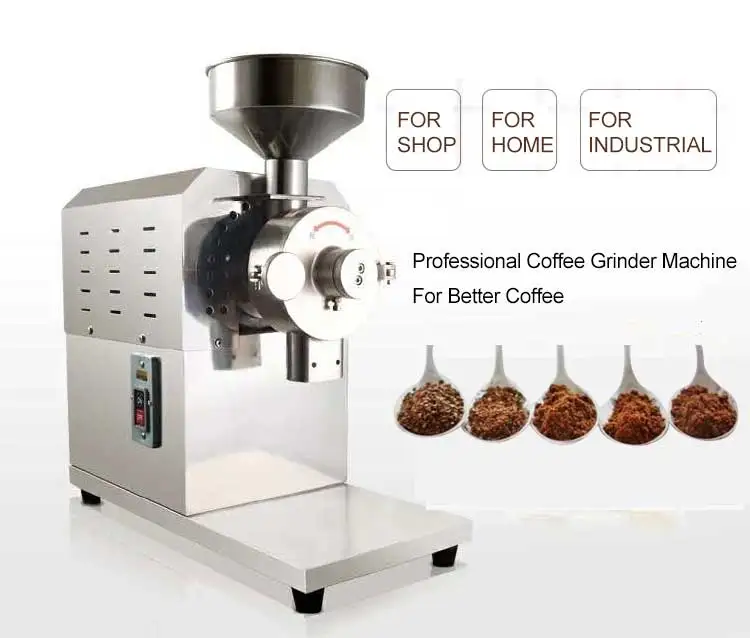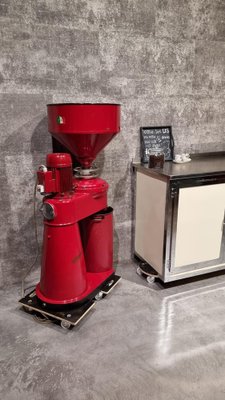Industrial Coffee Grinder for Large-Scale Brewing: A Necessary Tool
Industrial Coffee Grinder for Large-Scale Brewing: A Necessary Tool
Blog Article
Industrial Coffee Mill Guide: Increase Effectiveness and Quality
In the affordable landscape of coffee manufacturing, picking the appropriate commercial coffee mill plays a pivotal function in boosting both efficiency and item high quality. Recognizing the subtleties of numerous mill types and essential functions-- such as adjustable grind setups and durable building-- can dramatically affect the final flavor profile of the coffee.
Understanding Mill Kinds
When selecting an industrial coffee grinder, recognizing the numerous kinds available is vital for maximizing both flavor extraction and functional efficiency. Both key kinds of grinders are blade grinders and burr grinders. Blade mills use sharp blades that slice coffee beans into irregular dimensions, leading to uneven removal and potentially unfavorable flavors. While blade grinders are often much more ideal and budget friendly for small procedures, they are usually not suggested for industrial usage.

Inevitably, picking the appropriate kind of grinder is indispensable to preserving high quality and efficiency in coffee production, making it crucial for businesses to buy high-grade burr grinders for ideal outcomes.
Key Functions to Take Into Consideration
Choosing an industrial coffee mill requires careful consideration of several essential attributes that can considerably influence both performance and the general coffee experience. Among the key facets to evaluate is the grinding mechanism. Burr grinders are usually chosen over blade mills, as they offer a regular grind dimension, which is crucial for optimal removal and flavor.
An additional vital feature is the grinder's capacity. A functional mill with several setups enables you to customize the grind size to different brewing approaches, improving the coffee's taste account.
Examine the mill's sound level, particularly in a busy coffee shop or manufacturing setting, where extreme sound can be turbulent. Spending in a grinder that stabilizes these attributes can substantially boost both functional effectiveness and the top quality of the coffee served.
Optimizing Grinding Process
To achieve the very best lead to coffee preparation, enhancing the grinding process is vital. The grind dimension dramatically affects extraction, taste, and total quality of the made coffee. Different brewing methods call for specific grind sizes; for example, espresso requires a great grind, while French press necessitates a coarse texture. Understanding the relationship in between grind dimension and brewing approach is the initial step in optimization.


In addition, keeping track of the grinding this contact form speed can optimize the process. Slower grinding typically creates much less warm, protecting fragile flavors and aromas. Conversely, faster grinding may create extreme warmth, adversely affecting the coffee's high quality.
Maintenance and Care Tips
Proper maintenance and treatment of commercial coffee mills are necessary for ensuring optimal performance and long life. Normal cleaning is the foundation of upkeep; residue buildup can influence taste and grinding effectiveness. It is recommended to clean up the grinder after each usage, cleaning down the exterior and removing any kind of coffee premises from the burrs.
Furthermore, evaluate the grinding burrs for deterioration. Dull burrs can compromise grind consistency, so they need to be changed as required. Industrial Coffee Grinder. Periodically adjusting the grinder is additionally crucial, as this keeps the preferred work dimension for different brewing approaches
Lubrication of moving components ought to be performed according to the manufacturer's requirements, as this decreases rubbing and extends the life of the equipment. It is vital to make use of food-grade lubes to ensure safety and security and compliance with wellness regulations.
Last but not least, keep the mill in a stable and dry setting to stop corrosion and corrosion. By adhering to these maintenance and care pointers, operators can improve the efficiency of their industrial coffee mills while making sure premium result and prolonged operational life.
Roi Evaluation
Evaluating the return on investment (ROI) for commercial coffee grinders is critical for businesses seeking to enhance their coffee manufacturing capacities. A comprehensive ROI evaluation aids establish the financial practicality of investing in high-grade mills, permitting businesses to weigh the initial prices versus possible gains.
To conduct an extensive ROI analysis, companies need to consider several key elements. First, evaluate the acquisition price of the mill, consisting of installment and any kind of needed modifications to existing facilities. Next, calculate functional prices, consisting of energy consumption, upkeep costs, and labor efficiency improvements. High-performance mills often bring about minimized grinding time and boosted throughput, which can significantly boost performance.
In addition, think about the influence on product quality. Industrial Coffee Grinder. Superior grinders generate an even more regular grind dimension, which can improve taste accounts basics and client complete satisfaction, inevitably driving sales. By boosting the top quality of the end product, organizations can justify greater pricing, causing raised income
Verdict
In summary, a commercial coffee grinder plays an essential duty in improving both performance and product high quality within coffee manufacturing. By selecting top notch burr grinders geared up with crucial features such as flexible work settings see page and durable building, organizations can guarantee ideal taste extraction. Routine upkeep is critical for maintaining mill efficiency and making the most of client fulfillment. Inevitably, the tactical financial investment in a trusted mill adds significantly to improved revenue and competitiveness in the coffee industry.
In the affordable landscape of coffee production, choosing the best industrial coffee mill plays a crucial function in boosting both efficiency and item top quality. The two primary kinds of grinders are blade mills and burr grinders. Within the burr grinder category, there are level burr grinders and conelike burr mills, each with its advantages. Burr mills are normally liked over blade grinders, as they give a regular grind size, which is critical for optimum extraction and taste.
In recap, an industrial coffee grinder plays a crucial function in enhancing both performance and product high quality within coffee production.
Report this page